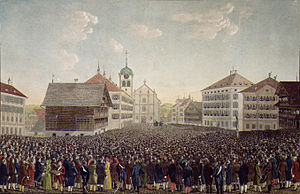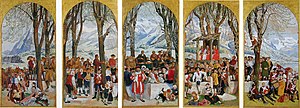User:Thomur/sandbox
 | This is a user sandbox of Thomur. You can use it for testing or practicing edits. This is not the sandbox where you should draft your assigned article for a dashboard.wikiedu.org course. To find the right sandbox for your assignment, visit your Dashboard course page and follow the Sandbox Draft link for your assigned article in the My Articles section. |

| This article is part of a series on the |
 |
|---|
|
|
The Landsgemeinde or "cantonal assembly" is a public, non-secret ballot voting system operating by majority rule, which constitutes one of the oldest forms of direct democracy. Still at use at the subnational political level in Switzerland, it was formerly practiced in eight cantons. For practical reasons, the Landsgemeinde has been abolished at the cantonal level in all but two cantons where it holds the highest political authority: Appenzell Inner Rhodes and Glarus. The Landsgemeinde is also being convened in some districts of Appenzell Inner Rhodes, Grisons and Schwyz to vote on local questions.
The German term Landsgemeinde itself is attested from at least the 16th century, in the 1561 dictionary of Pictorius. It is a compound from Land "land, canton; rural canton" and Gemeinde "community, commune".
Eligible citizens of the canton or district meet on a certain day in the open air to decide on a specific issues. Everyone can debate a question. Voting is accomplished by those in favor of a motion raising their hands. Historically, or in Appenzell until the admission of women, the only proof of citizenship necessary for men to enter the voting area was to show their ceremonial sword or Swiss military sidearm (bayonet); this gave proof that you were a freeman allowed to bear arms and to vote.
The Landsgemeinde has been the sovereign institution of the Swiss rural cantons since the later Middle Ages, while in the city-cantons such as Lucerne, Schaffhausen, or Bern, a general assembly of all citizens had never been established.
Similar assemblies in dependent territories were known under terms such as Talgemeinde (for Talschaften, used in Ursern, Hasli, Obersimmental), Teding (Engelberg), Parlamento (Leventina), Zendgemeinden (for the Zenden or districts of Valais), but also as Landsgemeinde in Toggenburg and in parts of Grisons.[1]
Use & Structure[edit]
Use[edit]
Administrative divisions
Cantons
Districts
Subject of the votes
Symptomatic of the federalist system of Switzerland [2], the Landsgemeinde differs in the scope of its usage from canton to canton. The legislative power is concerned both in Appenzell Inner Rhodes and Glarus, where the Landsgemeinde can be used to implement laws or modify the cantonal constitution. In Appenzell Inner Rhodes, the Landsgemeinde can also cover governmental issues [3], while it is through this institution that tax laws are regulated in Glarus [4].
Structure[edit]
Polar questions
Non-secret ballots
Hand rise or voter identification card
Majority Vote
History[edit]
Origin[edit]

The Landsgemeinde assembly is a tradition with continuity back to the later Middle Ages, first recorded in the context of the formation of the Old Swiss Confederacy. The tradition ultimately continues the Germanic thing, although not uninterruptedly, as the Alamanni had lost their independence to the Frankish Empire in the 8th century, but re-emerging in territories with imperial immediacy since the 13th century. The first Landsgemeinde proper is attested for Uri in 1231; however, these early assemblies grew as it were seamlessly out of the older institution of blood courts (assemblies with the purpose of dispensing judgement on criminal offenses, see high justice). The Middle Latin texts when recording a Landsgemeinde usually express this by making universitas "the universality", or communitas hominum "the community of men" of a certain canton the subject of a sentence (see, for example, the Federal Charter of 1291), in order to emphasize that the decision was made by the community (direct democracy) rather than by a political elite.
In the Old Swiss Confederacy, the existence of a Landsgemeinde was the defining feature of the rural cantons (Länderorte, as opposed to the city-cantons). These cantons were: Uri, Schwyz, Unterwalden (the forest-cantons), Glarus and Appenzell and Zug. Zug took an intermediate position, as it was a city-canton which due to the existence of a Landsgemeinde was also counted under the rural cantons.
With the formation of Switzerland as a federal state, the formerly sovereign cantonal assemblies became subject to federal law, and the Landsgemeinden came to be seen as anachronisms.
Evolution[edit]
The usage of the Landsgemeinde was progressively abandoned at the Cantonal level through the 19th and 20th century. Indeed, Zug and Schwyz jettisoned it in 1848, followed by Uri in 1928. Nidwalden in 1996, Appenzell Outer Rhodes in 1997 and Obwalden in 1998 abolished their Cantonal Landsgemeinde by secret ballot votes.
Currently, Appenzell Inner Rhodes and Glarus are the only remaining Cantons to use this traditional form of direct democracy.
Appenzell Inner Rhodes rejected in 1991 by Landsgemeinde the abolition of this institution.
Related political paradigms and criticisms[edit]
Direct Democracy[edit]
Deliberative Democracy[edit]
Glarus vs Appenzell
Ochlocracy[edit]
Non-secret ballot
Similar institutions[edit]
See also[edit]
Bibliography[edit]
- T. Favre-Bulle, The Urban Diffusion of Local Direct Democracy between Switzerland and the United States, 2015
- H. Ryffel, Die schweiz. L. nach geltendem Rechte, 1903
- W.-A. Liebeskind, L. et suffrage féminin, 1971, 371-375
- S. Duroy, «Les "Landsgemeinden suisses"», in Les procédés de la démocratie semi-directe dans l'administration locale en Suisse, 1987, 1-94
- H.R. Stauffacher, Herrschaft und L., 1989
- P. Blickle, «Friede und Verfassung, Voraussetzungen und Folgen der Eidgenossenschaft von 1291», in Innerschweiz und frühe Eidgenossenschaft 1, 1990, 15-202
- U. Kälin, Die Urner Magistratenfam., 1991
- L. Carlen, «Die Landsgemeinde», in Die Ursprünge der schweizerischen direkten Demokratie, ed. A. Auer, 1996, 15-25, (with Bibl.)
- F. Brändle, Demokratie und Charisma, 2005
- B. Adler, Die Entstehung der direkten Demokratie, 2006
- B. Wickli, Polit. Kultur und die "reine Demokratie", 2006
